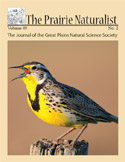Great Plains Natural Science Society

The Prairie Naturalist
Date of this Version
6-2012
Document Type
Article
Citation
The Prairie Naturalist 44(1):63–65; 2012
Abstract
Ants are ubiquitous and influential organisms in terrestrial ecosystems. About 1,000 ant species occur in North America, where they are found in nearly every habitat (Fisher and Cover 2007). Ants are critical to ecological processes and structure. Ants affect soils via tunneling activity (Baxter and Hole 1967), disperse plant seeds (Lengyel et al. 2009), prey upon a variety of insects and other invertebrates (Way and Khoo 1992, Folgarait 1998), are often effective primary consumers through their prodigious consumption of floral and especially extrafloral nectar, and honeydew (Tobin 1994), and serve as prey for invertebrates (Gotelli 1996, Gastreich 1999) and vertebrates (Reiss 2001).
In Nebraska, ants have been the subject of relatively few in-depth analyses, including theses (Bare 1929, Henzlik 1960, Schmitt 1973, McClelland 1978) and other studies (Fichter 1954, Ballard and Mayo 1979). Nebraska is the only state in the Great Plains that has not had the ant fauna recently surveyed, in contrast to North Dakota (Wheeler and Wheeler 1963, 1977), South Dakota (Wheeler and Wheeler 1987), Montana (Wheeler and Wheeler 1988a), Wyoming (Wheeler and Wheeler 1988b), Colorado (Gregg 1963), Kansas (Dubois 1985, Dubois and Danoff-Burg 1994), New Mexico (Mackay and Mackay 2002), Oklahoma (Wheeler and Wheeler 1989), and Texas (Wheeler and Wheeler 1985). To date, a comprehensive Nebraska ant list is currently unavailable, though a recent survey of Nebraska’s ant fauna was conducted in 31 of 93 counties; results of this survey are currently being prepared for publication in the scientific literature (W.W. Hoback, University of Nebraska- Kearney, personal communication). Presently 104 known ant species have been documented in Nebraska, some of which have not been formally described in the scientific literature (J. Jurzenski, University of Nebraska-Lincoln, and R. Lawson, Chadron State College, personal communication).
Included in
Biodiversity Commons, Botany Commons, Ecology and Evolutionary Biology Commons, Natural Resources and Conservation Commons, Systems Biology Commons, Weed Science Commons


Comments
Published by the Great Plains Natural Science Society. Used by permission.